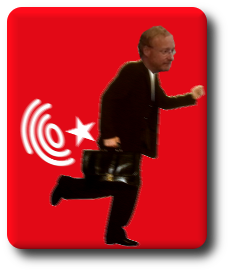

 Corrupt European Patent Office (EPO) officials, in violation -- a gross violation too we must stress -- of Office rules and its very constitution, the EPC, attacked a judge and then sent all of his colleagues away (to exile in Haar). Even patent maximalists are unable to ignore that. This was covered by Dr. Bausch earlier this month and now comes this article titled "Is The Location Of The Boards Of Appeal In Haar Contrary To The EPC?" (almost a rhetorical question)
Corrupt European Patent Office (EPO) officials, in violation -- a gross violation too we must stress -- of Office rules and its very constitution, the EPC, attacked a judge and then sent all of his colleagues away (to exile in Haar). Even patent maximalists are unable to ignore that. This was covered by Dr. Bausch earlier this month and now comes this article titled "Is The Location Of The Boards Of Appeal In Haar Contrary To The EPC?" (almost a rhetorical question)
What can the case entail when judges are not independent? It is a cyclical problem.
To quote:
The facts of this case are rather unusual, in that the appeal in question was filed by a "third party" against a decision to grant a European patent. The appellant sought to argue that its appeal was admissible on the basis that (a) the patent was granted despite clarity objections raised in third party observations during pre-grant examination, (b) clarity is not available as a ground of post-grant opposition, and so (c) the only available remedy for the third party was to appeal against the decision to grant.
The Board of Appeal summoned the appellant to oral proceedings in Haar (where the Boards of Appeal are located). In response, the appellant requested that the oral proceedings were relocated to Munich, on the basis that Haar is not specified in the EPC as a location of the EPO. The Board of Appeal then cancelled the hearing and referred the above questions to the Enlarged Board of Appeal. Specifically, the Board of Appeal considered that input from the Enlarged Board of Appeal was needed concerning the right to oral proceedings in the case of prima facie inadmissible appeals (question 1) and whether the appeal was in fact prima facie inadmissible (question 2). If the answer to either of questions 1 and 2 is no, the Enlarged Board of Appeal will then consider whether Munich encompasses Haar.
Question 3 is perhaps of more general interest than the questions 1 and 2. Article 6(2) EPC states that "The European Patent Office shall be located in Munich. It shall have a branch at the Hague." The Protocol on Centralisation provides for a sub-office in Berlin. The Boards of Appeal moved from a central Munich location to Haar (which is suburb of Munich) in 2017. If Haar is not considered to be in Munich, then the current location of the Boards of Appeal could be found to be contrary to the EPC.
The Boards of Appeal's move to Haar was not universally popular, and indeed it happened against a backdrop of tension between the then-President of the EPO and Boards of Appeal. It will therefore be interesting to see how the Enlarged Board of Appeal responds to question 3 (assuming it answers "no" to one of questions 1 and 2). Of course, the Enlarged Board of Appeal will be able to avoid answering question 3 if it answers yes to both questions 1 and 2.
Today, the Federal Circuit will hear oral argument in the BTG v. Amneal Pharmaceuticals case. In addition to standard disputes over whether the patent-in-suit was obvious and whether it was infringed, this case presents a novel issue regarding estoppel for IPR petitioners.
Essentially, the question is whether a petitioner who successfully challenges a claim at the PTAB is barred from arguing invalidity of that claim in district court. BTG—and the USPTO, in an amicus brief—argues that if you win at the USPTO, you thereby have to lose at district court, at least until all rehearings and appeals are exhausted.
Appeals are a process that can take years—years during which you might be barred from putting your product on the market, even though the USPTO already said that there was no valid patent blocking your path.
epo.org link), having composed a report on a software patents advocacy event it organised along with patent trolls from another continent. Here they go again:
As a follow-up to its "Patenting Blockchain" conference, the European Patent Office (EPO) has published a conference report entitled "Talking about a new revolution: blockchain" to provide insight into the impact of this technology on the patent system. Held at the EPO in The Hague in December last year - the conference was the first event organised by an IP5 office on this topic.
Prior to joining SFK, Burö worked in Volvo’s patent department and was responsible for IP at Renault Trucks in Lyon and creating an IP function in the US.
On Jan. 31, 2019, the World Intellectual Property Organization, released its first publication in a series of “Technology Trends” studies.[1] This study concerned inventions based on artificial intelligence. Unsurprisingly, WIPO found...
"Campinos passively it not actively perpetuates injustice."Citing WIPO's propaganda on "AI", it mentions patents. Imagine making a country's strategy a mere buzzword like "AI" in relation to patents. From the article: "It is said that China is ahead of other countries when including in AI in their national strategy. AI as an agenda topic of international institutions reveals objective data as far as possible to the question "Which country is leading the AI sector?" A key report that the U.N.'s World Intellectual Property Organization (WIPO) published helps keep a finger on the pulse of the world in terms of country, company and sector categories."
Shouldn't the Boards of Appeal put an end to this whole "AI" nonsense? Can they? As it stands at the moment, by their very own admission, they still lack independence. 9 months later Campinos did absolutely nothing about it. Campinos passively it not actively perpetuates injustice. ⬆